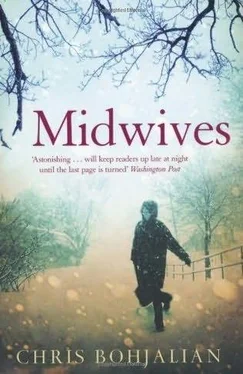Chris Bohjalian - Midwives
Здесь есть возможность читать онлайн «Chris Bohjalian - Midwives» весь текст электронной книги совершенно бесплатно (целиком полную версию без сокращений). В некоторых случаях можно слушать аудио, скачать через торрент в формате fb2 и присутствует краткое содержание. Жанр: Современная проза, на английском языке. Описание произведения, (предисловие) а так же отзывы посетителей доступны на портале библиотеки ЛибКат.
- Название:Midwives
- Автор:
- Жанр:
- Год:неизвестен
- ISBN:нет данных
- Рейтинг книги:5 / 5. Голосов: 1
-
Избранное:Добавить в избранное
- Отзывы:
-
Ваша оценка:
- 100
- 1
- 2
- 3
- 4
- 5
Midwives: краткое содержание, описание и аннотация
Предлагаем к чтению аннотацию, описание, краткое содержание или предисловие (зависит от того, что написал сам автор книги «Midwives»). Если вы не нашли необходимую информацию о книге — напишите в комментариях, мы постараемся отыскать её.
Midwives — читать онлайн бесплатно полную книгу (весь текст) целиком
Ниже представлен текст книги, разбитый по страницам. Система сохранения места последней прочитанной страницы, позволяет с удобством читать онлайн бесплатно книгу «Midwives», без необходимости каждый раз заново искать на чём Вы остановились. Поставьте закладку, и сможете в любой момент перейти на страницу, на которой закончили чтение.
Интервал:
Закладка:
But I think Stephen stopped himself because my father was present. He probably would have told my mother exactly how attractive he thought she was had the two of them been alone.
"Sure, I'm ready," my mother said. "I don't really have a choice now, do I?"
"No. Guess not."
My mother nodded, and my father wrapped his arm around her shoulders.
"It's cold out here," he said to the lawyers and me. "Let's go inside."
"Grandma's not here yet," I said, speaking to no one in particular.
"Is your grandma the type who could find her way into the courtroom?" Stephen asked.
Before I could answer, my father said he would walk with us as far as the front door of the courthouse and then wait for grandma there. And so amidst the aroma of fresh paint and poster board, the five of us made our way through a small sea of women in paisley peasant skirts and babushkas, men with beards that fell halfway down their chests, and dozens and dozens of male and female feet in heavy wool socks and sandals.
I hadn't realized that Charlotte Fugett Bedford had a sister and a brother-in-law. Somehow I had missed the detail that she had a mother.
And no one had told me that the three of them had traveled from Alabama to Vermont to sit in a bench behind Bill Tanner and his deputy and watch my mother's trial.
But when I walked into the courtroom, I knew instantly who they were. No one had to tell me. The two women had more than a vague resemblance to their dead kin, and the way the younger woman leaned into the younger man for support suggested marriage. And all three of them were wearing clothing too summery and thin for Vermont in the last week of September.
I saw them before they saw me, and so that first morning I was able to look away before our eyes met and I would have to acknowledge the sadness that had scarred their faces. Although I don't believe I had ever viewed the Fugetts or the Bedfords as possessing the sort of evil Bill Tanner embodied, somehow that summer I had managed to forget or ignore that my mother was not the victim in this tragedy, or that-in most people's eyes-she was not the only one who was suffering.
Twenty-eight possible jurors were sat by the bailiff in four rows of seven: Two of those rows were in the raised jury box itself, and two more were in wooden chairs with cushioned seats directly before it. That meant the first two rows were lower than the pair in the jury box, and so that side of the courtroom looked a bit to me like a movie theater. The seats had a downhill sort of slope.
In addition, another dozen possible jurors were seated in the two benches in the courtroom nearest the jury box, and as the morning progressed and Bill Tanner asked a seemingly endless number of questions, some of them took the place of their peers in the rows along the side of the courtroom.
The goal was to find twelve jurors and two alternates whom both Stephen Hastings and Bill Tanner would accept. Each side was allowed to strike up to six people without offering the judge a reason, which meant that if there were only one or two challenges for cause-the elimination of a possible juror for reasons as dramatic as an admitted bias, or as pedestrian as a doctor's appointment during the trial that simply could not be rescheduled-a jury could be built from that first group of twenty-eight people.
Of course, it rarely happened that way, and my mother's trial was certainly no exception. There was no limit to the number of possible jurors who could be eliminated for cause, and the lead attorneys on both sides seemed to be quite good at rooting out reasons to have people excused that would not demand they use any of their six precious preemptory strikes.
Perhaps somewhere in the files in the basement of the Orleans County Courthouse, or on a floppy disk or computer in one of the offices on the building's second or third floors, exist the names of the couple of dozen women and men who were part of that original late-September pool. Perhaps not. But many of the names of that first twenty-eight (and of the reinforcements who joined them, as one by one Stephen or Bill Tanner excused someone after eliciting yet another reason why that individual could not objectively or logistically sit in judgment upon my mother) have blurred in my mind with the names of the final fourteen.
Not the faces, however; I still know the faces and features of that final fourteen well. Moreover, I know-or at least I believe I know-exactly whom Stephen was happy to have sitting in the jury box for two weeks, and exactly who made him uncomfortable.
"Would you want people on the jury who love the idea of a home birth, or people who think it's an incredibly foolish notion?" Stephen asked my parents and me the Thursday night before the trial started. Stephen had taken my family to dinner at a French restaurant in Stowe, the sort of place that had me pulling blouses and skirts from my closet for forty minutes before I found a combination that I thought was at once appropriately elegant and sufficiently cool. Stowe was slightly closer to Reddington than Burlington, but it was still vaguely equidistant between the two, and I imagine Stephen was hoping a dinner out would rally my mother's spirits before the trial finally began.
We had finished eating and the three adults were sipping their coffee when Stephen broached the subject of the jury's configuration.
As if he were a law school professor and the Danforth family a small group of students, he continued, "What do you think: Would you want a group who thought home birth was a perfectly safe proposition, or a group who thought it riskier than landing an airplane in a hurricane?"
"I suppose I'd want people who approved of home birth," my father said quickly. "They'd be more sympathetic."
"More sympathetic to Charlotte or Sibyl?"
"Sibyl," my father answered, and instantly I began to fear that the conversation was about to take one of those turns that I dreaded. I couldn't tell if my father's answer was wrong and his mistake would embarrass-and then anger-him, or if the discussion would deteriorate simply because the subject was so volatile. But I knew I didn't like the way Stephen put down his coffee cup and shrugged after my father blurted out my mother's name.
"Maybe those are the sort of people we'll want," Stephen said slowly, "but maybe not. Obviously my partners and I have gone around and around on this one. Personally, I want to see the jury stacked with people who believe home birth is a reasonable way to have a baby. But I have two partners who are quite convincing when they argue that I should try and get a group who thinks the idea of having your baby in your bedroom is a terrifically stupid stunt, a group who…"
"A group who what?" my mother asked Stephen when he paused.
"Forgive me, Sibyl," Stephen said, taking a deep breath before finishing his thought. "A group who thinks the idea of home birth is so… dangerous that Charlotte Bedford got what she asked for."
My mother tilted her head and rested the fingers of one hand on the small of her neck. I remember that all of the tables in the restaurant-filled that evening with the sort of wealthy, elderly couples who packed Vermont in the fall to watch the leaves grow yellow and gold and fantastic shades of red-seemed to become quiet around us, and suddenly I no longer even heard the tapes of classical music that had been playing throughout our meal. I heard a high ringing in my ears, and I wondered what would happen first: Would my mother cry, or would my father snap at Stephen?
I was wrong; neither occurred. I believe my father might have been about to tell Stephen angrily that his remarks were out of line, but my mother spoke first. Though tired, though unwilling to buck up in the sort of physical, visible ways the men around her wanted, my mother was still very strong.
Читать дальшеИнтервал:
Закладка:
Похожие книги на «Midwives»
Представляем Вашему вниманию похожие книги на «Midwives» списком для выбора. Мы отобрали схожую по названию и смыслу литературу в надежде предоставить читателям больше вариантов отыскать новые, интересные, ещё непрочитанные произведения.
Обсуждение, отзывы о книге «Midwives» и просто собственные мнения читателей. Оставьте ваши комментарии, напишите, что Вы думаете о произведении, его смысле или главных героях. Укажите что конкретно понравилось, а что нет, и почему Вы так считаете.











